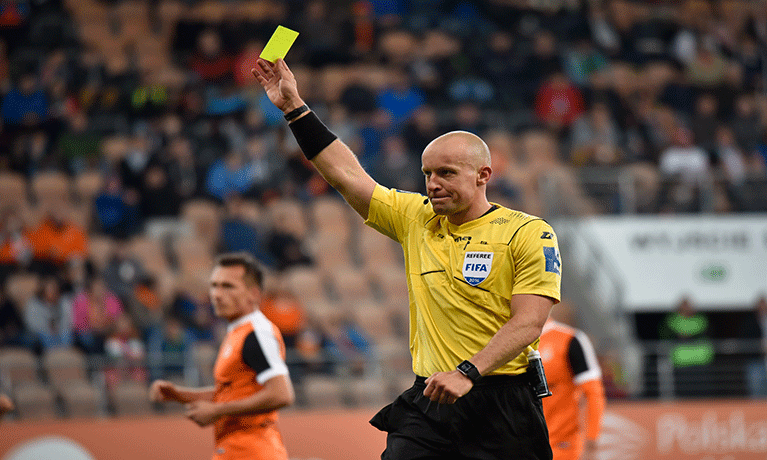By Dr Tom Webb, Centre for Business in Society
On 27th November 2023 the International Football Association Board (IFAB) met in London to discuss measures that might improve participant behaviour and respect towards referees in football. The game is struggling with abuse and aggression towards referees and the associated lack of recruitment and retention of referees, as the general behaviour of participants at all levels of the game continues to be a concern in countries around the world. Some interventions have already been trialled or are currently in progress. For example, in England and Canada, body cameras are being fitted to referees to see if they can improve the behaviour of players on the field of play. In England, the trial has just been expanded due to the encouraging results of the first phase of the trial.
VAR in Football
The changes highlighted above are all set against a backdrop of continuing issues for referees at all levels of football. In professional football, the introduction and use of Video Assistant Referees (VAR) is proving difficult to manage and is providing regular discussion and talking points seemingly every weekend in the English Premier League. It has led to the introduction of the ‘Match Officials Mic’d Up’ programme which is aired on TNT Sports and SkySports in the United Kingdom and presented by Michael Owen alongside Howard Webb, who is the Chief Refereeing Officer at Professional Game Match Officials Limited (PGMOL). The show has been commissioned to help explain refereeing decisions in the Premier League and provide some additional insight for supporters.
Audio from the VAR control room is released around some contentious incidents, with the aim of providing supporters with a rationale behind the decision-making process. The decisions are then discussed and explained in the ‘Mic’d Up’ programme. This is a new approach from those involved with professional refereeing, arguably is intended to provide accountability around the decisions of referees. However, the introduction of ‘Mic’d Up’ would not have occurred without the introduction of VAR some years earlier. Critics of VAR maintain that the system is inconsistent, whilst there is constant scrutiny of perceived errors and problems, alongside alternative views of what a game without VAR decisions influencing the outcome of matches might look like.
Trials and Changes to the Laws of the Game
It is the behaviour towards referees which is arguably the most concerning aspect of this brave new world. IFAB have had to introduce trials where only the captains of teams are able to approach the referee in major game situations. However, since this announcement, we have seen Manchester City charged by the Football Association (FA) with failing to control their players after the referee was surrounded during the match against Tottenham Hotspur. Also, at the IFAB meeting mentioned above, it was announced that temporary dismissals (sin bins) for dissent and tactical offences would be trialled at higher levels of the game, following initial trials in grassroots football. We also learned that the Laws of the Game would be applied more strictly against players and coaches who showed disrespectful conduct around the field of play; improved control and management of mass confrontations were also discussed.
But why are these changes being implemented now? Why are these trials being ushered through with apparent regularity, when, for a number of years IFAB was arguably tinkering around the edge of the Laws of the Game?
Referee Abuse, Recruitment and Retention
The situation in refereeing cannot continue as it is. UEFA have recognised a chronic shortage of referees across the continent of Europe and as a response have launched a recruitment campaign, supporting national associations, entitled ‘Be a Referee’. The negative behaviour towards officials in the professional game, broadcast around the world for millions to observe, will not help any recruitment drive. It will also not help retain those referees that are already involved in the game. If negative behaviour is not tackled then the recruitment and retention crisis in football refereeing will continue, fewer fixtures will be played, fewer people will be playing competitive sport and the talent development pathway for referees into the professional game, where they might encounter systems such as VAR, will become even more difficult to manage, identify and promote talent.
We are at a crossroads. The intervention of IFAB shows the level of importance attached to the challenges laid out above. The game is running out of time.
Through understanding the impact of organisations’ activities, behaviours and policies, the Centre for Business in Society at Coventry University seeks to promote responsibility, to change behaviours, and to achieve better outcomes for economies, societies and the individual.




Comments are disabled